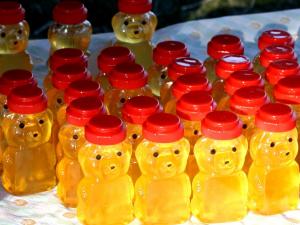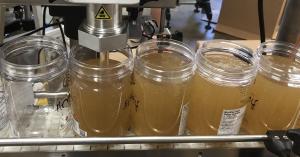
Raw Honey is Safer to Eat than Pasteurized Honey

Pasteurized and heavily processed honey is not only less healthy than raw honey, it may be less safe.
While “Pastuerized” has become synonymous with “food safety” due to its enormous public health benefits with dairy products, the same does not apply to honey.
Dairy products are not the only raw food associated with outbreaks of serious bacterial illnesses. Raw meat, especially if processed or stored under unhygienic conditions, can grow bacteria that cause serious bacterial infections. Eating raw vegetables, especially hard to clean ones, like lettuce can also result in bacterial infections if the vegetables are contaminated with soil containing pathogenic bacteria.
However, pasteurization of honey has never been about food safety. Honey is pasteurized to prevent souring and extend the shelf life, similar to the original purpose of the process Louis Pasteur modified. Pasteurizing raw honey kills only the harmless natural yeasts that can cause honey to ferment if exposed to warmth and humidity over weeks to months.
Here is what the renowned Mayo Clinic has to say on the food safety of consuming raw honey:
“’Pasteurization’ of honey actually has no technical meaning, and heating honey doesn’t provide any food safety advantage. Producers may heat honey to keep it from crystallizing but there is nothing safer about honey calling itself ‘pasteurized’ honey versus ‘raw’ honey.
Therefore, you will not find any research or government advice indicating the need for immune compromised patients to use ‘pasteurized’ honey. Food-borne pathogens actually do not survive in honey, so there is no additional risk in consuming it raw.”
While the Mayo Clinic is speaking specifically about raw honey consumption not posing a risk in vulnerable, immune-compromised individuals, that fact that disease-causing bacteria cannot survive in honey is relevant to anybody concerned about the safety of raw honey. All raw honeys (not only manuka honey) have remarkable antibiotic properties that kill or inhibit virtually all disease-causing bacteria, even those “superbugs” that are resistant to almost all known pharmaceutical antibiotics.
Raw honey does contain natural yeasts that are inert in the honey as it exists in its mature state in a beehive, and, at least initially, in the jar in your home. The low water content of mature honey prevents the yeasts from metabolizing and multiplying. Honey is very hygroscopic (it absorbs water readily from other substances including the atmosphere). Over time, exposed to a warm, humid environment, the honey moisture content increases and yeasts begin to metabolize, gradually fermenting the raw honey. While the fermentation changes the flavor of the honey, fermented honey is still completely safe to consume.
The fact that natural honey can be safely stored at room temperature has been known for millennia. Modern research has elucidated the mechanisms and reasons why raw honey has such an exceptionally high degree of food safety. Like the fact that raw honey is healthier than processed honey due to having its healthy bee enzymes, organic polyphenols and flavinoids undamaged by the heating of pasteurization, the fact that eating raw honey poses no greater risks than eating pasteurized honey is beyond dispute. However, there are some good reasons to support raw honey actually being safer to eat than pasteurized honey.
The antibacterial properties of most honeys (except manuka, tualang and a few others) are greatly diminished by the pasteurization process, so, while bacteria are unable grow in raw honey, they are more likely to be able to grow in pasteurized honey. This raises the theoretical possibility that pasteurized honey could be more likely to act as a substrate for bacterial growth if contaminated by bacteria compared to raw honey which will kill or inhibit bacteria introduced by accidental contamination in the home.
Adulteration of honey with sugar syrups deserves special attention. Inexpensive processed sugars cost only a fraction of an equivalent amount of natural honey. Unscrupulous honey packagers and producers alike can increase their profit by adding much cheaper syrups of processed sugars to honey. Pasteurization of commercial honeys is virtually always accompanied by ultrafiltration of the honey which removes the pollen crystals present in raw, natural honey. Laboratory testing of pollen crystals can be used to identify the floral and geographical source of the honey. The combination of rampant adulteration of honey with processed sugar syrups and the difficulty in proving processed honey authenticity led Food Safety News to declare in a 2011 that “Tests Show Most Store Honey Isn't Honey”. Based on ongoing news reports, this does not appear to have changed in the years since.
This “honey fraud” tends to be thought of as an economic crime: Consumers paying for expensive honey receive cheaper, lower quality, adulterated product instead. However, there is an often overlooked, but important element of health safety here. The health risks of a diet rich in processed sugars are well-established and manifold. Cardiovascular disease (including hypertension and heart attacks), obesity, diabetes, joint inflammation and other inflammatory conditions, and tooth decay have all been consistently and convincingly linked to processed sugar consumption. By contrast, an increasing body of evidence shows that raw honey decreases the risk of most, if not all, of these disease conditions. Unwittingly consuming extra processed sugars fraudulently added to honey would increase an individual's risk of all of these conditions.
While not a direct result of the honey pasteurization process, the increased risk of consuming processed sugars in processed honey due to its higher chance of being adulterated versus raw honey can legitimately be thought of as a food safety issue.
NB: infants younger than one-year of age should not consume honey due to the low, but real, risk of acquiring infant botulism. Even in this specific case, the risk of infant botulism is no higher in raw honey than in pasteurized honey: the pasteurization process has no effect on the spores that could cause infant botulism.
Jeremy Wendell
Wendell Estate Honey
+1 204-564-2599
email us here
Visit us on social media:
Facebook
Instagram
YouTube
The journey of healthy, raw, unheated, unprocessed honey from beehive to jar at Wendell Honey Farm
Distribution channels: Agriculture, Farming & Forestry Industry, Beauty & Hair Care, Culture, Society & Lifestyle, Food & Beverage Industry, Sports, Fitness & Recreation
Legal Disclaimer:
EIN Presswire provides this news content "as is" without warranty of any kind. We do not accept any responsibility or liability for the accuracy, content, images, videos, licenses, completeness, legality, or reliability of the information contained in this article. If you have any complaints or copyright issues related to this article, kindly contact the author above.
Submit your press release

